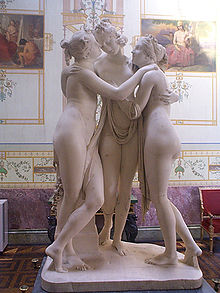Aglaea
| Aglaea | |
|---|---|
Goddess of grace, charm, and splendor | |
| Member of The Charites | |
 Aglaea (center), as depicted in Antonio Canova’s sculpture, The Three Graces. | |
| Affiliation | Aphrodite |
| Major cult centre | Boeotia |
| Abode | Mount Olympus |
| Personal information | |
| Parents | Zeus and Eurynome, Dionysus and Hera[1] |
| Siblings | Euphrosyne and Thalia |
| Spouse | Hephaestus |
| Children | Eucleia, Eupheme, Euthenia, and Philophrosyne |
Aglaea (/əˈɡliːə/) or Aglaïa (/əˈɡlaɪə/; Ancient Greek: Ἀγλαΐα means 'splendor, brilliant, shining one'[2]) is the name of several figures in Greek mythology, the best known of which is one of the three Charites or Gratiae (Graces).[3]
Mythology[]
Aglaea is the Greek goddess of beauty, splendor, glory, magnificence, and adornment.
She is the youngest of the Charites according to Hesiod.[4] Aglaea is one of three daughters of Zeus and either the Oceanid Eurynome, or of Eunomia, the goddess of good order and lawful conduct. Her two sisters are Euphrosyne, the goddess of joy or mirth, and Thalia, the goddess of festivity and rich banquets.[5] Together they are known as the Charities in Greek mythology or the Gratiae (Graces) in Roman mythology, and they were responsible for overseeing all feasts and dances.[6] They were part of the retinue of Aphrodite with Aglaea sometimes acting as her messenger.[7]
Aglaea was also known as Charis (the Grace) and Kale (Beauty).[8] Aglaea was married to Hephaestus, typically seen as after his divorce from Aphrodite, and by him she became mother of Eucleia ("Good Repute"), Eupheme ("Acclaim"), Euthenia ("Prosperity"), and Philophrosyne ("Welcome").[9]
Notes[]
| Look up Aglaea in Wiktionary, the free dictionary. |
- ^ Nonnus, Dionysiaca, 15.87 ff.; 33.4 ff.
- ^ Graves, Robert (2017). The Greek Myths - The Complete and Definitive Edition. Penguin Books Limited. pp. Index s.v. Aglaia. ISBN 9780241983386.
- ^ Bell, Robert E. (1991). Women of Classical Mythology: A Biographical Dictionary. ABC-CLIO. p. 15. ISBN 9780874365818.
- ^ Hesiod, Theogony 945
- ^ Hesiod, Theogony 907; Apollodorus, 1.3.1
- ^ Pindar, Olympian Ode 14.1–20
- ^ Nonnus, 24.261 ff.
- ^ Atsma, Aaron J. (2017). "Aglaia". Theoi Greek Mythology. Retrieved January 10, 2020.
- ^ Hesiod, Theogony 945; Orphic Rhapsodies (fragments)[not specific enough to verify]
References[]
- Apollodorus, The Library with an English Translation by Sir James George Frazer, F.B.A., F.R.S. in 2 Volumes, Cambridge, MA, Harvard University Press; London, William Heinemann Ltd. 1921. ISBN 0-674-99135-4. Online version at the Perseus Digital Library. Greek text available from the same website.
- Bell, Robert E., Women of Classical Mythology: A Biographical Dictionary. ABC-Clio. 1991. ISBN 9780874365818, 0874365813.
- Graves, Robert, The Greek Myths, Harmondsworth, London, England, Penguin Books, 1960. ISBN 978-0143106715
- Graves, Robert, The Greek Myths: The Complete and Definitive Edition. Penguin Books Limited. 2017. ISBN 978-0-241-98338-6, 024198338X
- Grimal, Pierre, The Dictionary of Classical Mythology, Wiley-Blackwell, 1996, ISBN 978-0-631-20102-1. "Charites" p. 99
- Hesiod, Theogony from The Homeric Hymns and Homerica with an English Translation by Hugh G. Evelyn-White, Cambridge, MA.,Harvard University Press; London, William Heinemann Ltd. 1914. Online version at the Perseus Digital Library. Greek text available from the same website.
- Nonnus of Panopolis, Dionysiaca translated by William Henry Denham Rouse (1863-1950), from the Loeb Classical Library, Cambridge, MA, Harvard University Press, 1940. Online version at the Topos Text Project.
- Nonnus of Panopolis, Dionysiaca. 3 Vols. W.H.D. Rouse. Cambridge, MA., Harvard University Press; London, William Heinemann, Ltd. 1940-1942. Greek text available at the Perseus Digital Library.
- Pindar, Odes translated by Diane Arnson Svarlien. 1990. Online version at the Perseus Digital Library.
- Pindar, The Odes of Pindar including the Principal Fragments with an Introduction and an English Translation by Sir John Sandys, Litt.D., FBA. Cambridge, MA., Harvard University Press; London, William Heinemann Ltd. 1937. Greek text available at the Perseus Digital Library.
- Smith, William; Dictionary of Greek and Roman Biography and Mythology, London (1873). "Charis"
- Greek goddesses
- Beauty goddesses
- Children of Zeus
- Consorts of Hephaestus
- Women in Greek mythology
- Characters in Greek mythology